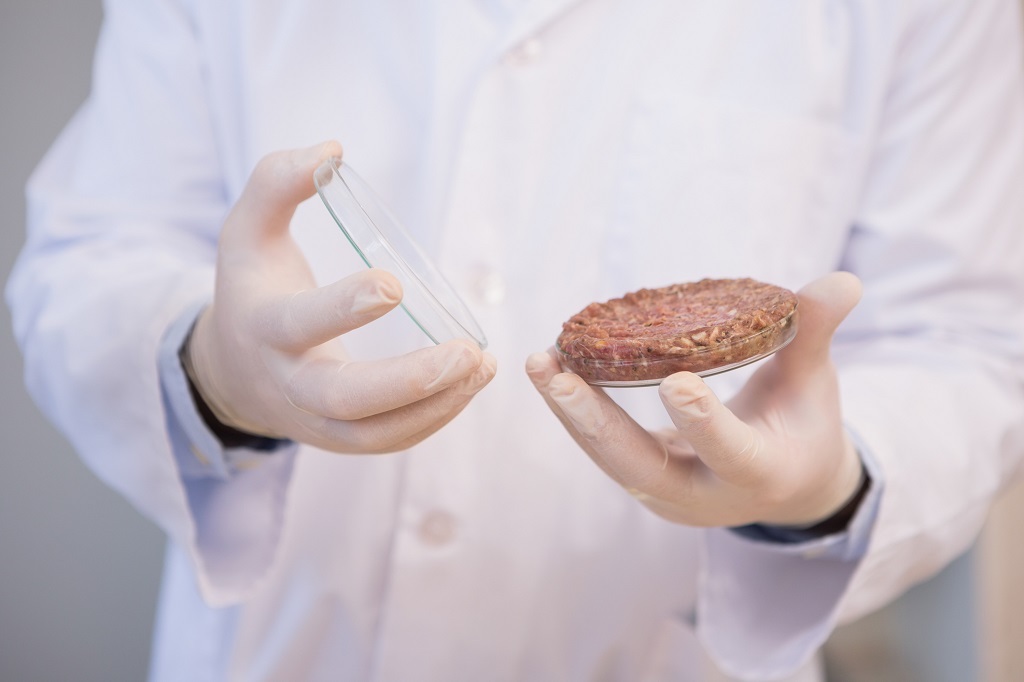
Memphis Meats
On Thursday, the Food and Drug Administration (FDA) and the United States Department of Agriculture (USDA) released their first official policy document on the joint regulation of “cell-cultured meat”—the government’s preferred nomenclature for products derived from animal cells, not carved from animal carcasses. Last fall, when the two government agencies first announced a plan to jointly oversee this new, hotly-anticipated, and still mostly speculative class of products, its leaders said the first step would be hammering out a framework. Now, that framework is here.
The memorandum of understanding states that FDA, which regulates biotechnology, will oversee the collection and growth of cultured cells. USDA, which regulates meat production, will oversee the processing of those cells into meat, and have the last world on labeling—an important responsibility, given the ontological gymnastics of marketing a food that feels more like Star Trek than McDonald’s.
The prospect of meat that doesn’t come directly from animals has rubbed animal farmers, and their trade associations, the wrong way from the get-go. That started to change last summer, when the North American Meat Institute (NAMI), which represents the country’s meatpackers, and Memphis Meats, one of the most prominent and cash-flush cell-cultured meat companies, jointly appealed to the White House to give jurisdiction to the two government agencies. The move suggested that meat processors and cell-cultured meat companies may be able to find common ground—perhaps unsurprising, as some of the world’s largest packers have started to invest in alt-protein companies themselves.
The U.S. Cattlemen’s Association (USCA), which has long objected to calling cell-cultured products “meat” or “beef” in any way, registered continued disappointment in the process. In an emailed statement, USCA president Kenny Graner reiterated the association’s position that cultured products should be called “protein,” and have their own, separate stamp of regulatory approval, rather than bearing “any of the three purple-inked USDA meat inspection stamps.”
Until recently, cell-based meat companies had resisted the idea that USDA would oversee their products, with many claiming that FDA, which regulates pharmaceutical and biotechnology products, was better-suited. Privately, however, some cell-based entrepreneurs feared that USDA’s cozy relationship with industry—the agency’s inspectors literally work alongside meatpacking employees in their plants—would be to their disadvantage as they bring the product to market.
Now, however, some of those groups have changed their tune. In a statement, Jessica Almy, the policy director at The Good Food Institute, a nonprofit that has backed development of the technology, praised the two agencies for their formal agreement, which paves the way for commercial production in the U.S. Previously, some companies, such as Just, Inc., had intoned darkly that if an agreement was not hatched soon enough, they would offshore production, and release it in other markets first. Almy also praised the agreement for one provision specifically: USDA will approve product labeling, preempting states like Missouri that have passed laws that would not allow such products to be labeled “meat.”
Uma Valeti, the head of Memphis Meats, has said his company is “ready go to market tomorrow,” and that the regulatory framework is the final hurdle. Whether or not that’s true remains unclear. Just, for example, similarly bragged that it would debut a cell-cultured meat product in 2018, a deadline which came and went.
While some of lab meat’s biggest investors and backers support the “slaughter-free” technology on animal welfare grounds, much of the public discussion around it has centered on its potential environmental benefits. In the United States, the gasses produced by livestock, principally heat-trapping methane, alone account for 4 percent of the country’s emissions. Worldwide, meat production accounts for as much as 14.5 percent of global greenhouse gas emissions, according to the U.N. Food and Agriculture Organization.
Proponents of lab-grown meat say the technology has the potential to drastically impact those emissions by removing much of the animal agriculture food chain from the production of meat. But that claim is unproven—and may turn out to be problematic. A recent study from Oxford found that, theoretically, cultured meat could actually increase greenhouse gas emissions, by replacing the methane produced by livestock with longer-lasting carbon dioxide as fossil fuels are burned to power industrial facilities.
If a regulatory framework is indeed the last step, and cell-cultured meat is ready to go into production, that will settle one area of long-standing uncertainty. But as fast-moving as this process has been, at least when it comes to regulation, it’s still not clear that any such products are ready for market, while a range of other questions, from social and environmental impacts to pricing and palatability, still remain.









